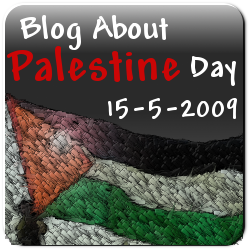Blog About Palestine Day: Social and Reproductive Justice under Occupation
This piece was writen as part of Blog About Palestine Day, 2009.

This piece was written as part of Blog About Palestine Day, 2009. Additionally, it is cross-posted at ChoiceUSA.
Mention of the "P Word" is bound to cause a stir; the Israel/Palestine conflict is one of the more politically and religiously-charged issues for people throughout the world. In the United States, religious institutions sway popular opinion, often ignoring the rights and well-being of one group to bolster support for the other. The conflict is spoken about dichotomously: to criticize Israel’s actions in Palestine is to unconditionally support all factions of Palestinian resistance, and vice-versa.
As a caucasian American with a middle-class upbringing, mere mention of Palestine in the context that the state has the right to exist leaves me open to accusations of "anti-Semitism," amongst other things. But as adherents for unequivocal social justice, allowing polarizing forces from either side to silence our voices will only lead to defeat.
Today marks the 61st anniversary of the Palestinian "Nakba" (catastrophe). On May 15, 1948, shortly after Britain pulled out of the territory, Israel drafted its declaration of independence, and over 700,000 Palestinians were forced from their homes. Today, over 4 million of their descendants live in the Gaza Strip or the West Bank, both occupied by the Israeli military. There is little mobility, widespread poverty, and ever-deteriorating conditions as tensions flare between Israel and Palestinian resistance groups. When these tensions flare, as seen during the Israel-Hamas conflict earlier this year, it is the people, the innocent civilians, that suffer most.
As a reproductive justice advocate, it is the conditions that everyday people must live in that concern me most. The lack of a "recognized state" by the world population means Palestine is often represented by extreme groups that, while voted in somewhat democratically, do not represent the will of the people. Most of the world considers Hamas to be a terrorist organization, and few Palestinians would argue that their tactics and religious laws are 100% morally sound. However, Hamas is one of the only groups that has promised to take a strong stance in fighting for the Palestinian Right to Return, a decidedly more important issue to those living in unimaginably constrained conditions throughout Palestine.
Health care is difficult to access in Palestine. A 40% unemployment rate (a 2007 figure from the World Health Organization) is merely one factor in the high rate of poverty and lack of mobility for refugee women. Very few are able to access even the most basic care for themselves and their families. The OPT Ministry of Health estimates lack of health care during pregnancy is the third most common cause of death amongst women of reproductive age in Palestine. In addition, because of the many checkpoints within the Occupied Territory, pregnant women often don’t make it to the hospital or birthing center. This means more and more women are choosing to birth at home for the sake of convenience and affordability. From an article by the UNFPA:
The Palestinian Ministry of Health reports that since the beginning of the Al-Aqsa Intifada in 2000, at least 68 pregnant Palestinian women gave birth at Israeli checkpoints, leading to 35 miscarriages and the death of five women. Additionally, 10 per cent of pregnant women spent 2-4 hours on the road before reaching a medical centre or a hospital, while 6 per cent spent more than four hours, when the normal traveling time before the Intifada was 15-30 minutes. This hardship is estimated to have contributed to an 8.2 per cent increase of home deliveries. There are a total of 528 checkpoints in the West Bank and Gaza.
In addition, due to the lack of contraception and access to prenatal care, the International Planned Parenthood Federation reports unsafe abortions lead to a high rate of mortality amongst young women. While abortion is severely restricted, women take matters into their own hands, or sometimes find a "back-alley" abortion now so far in the past to most women in the U.S.
Let’s leave politics behind and recognize that human suffering is just that, human suffering. Our personal convictions about whether or not Palestine should exist, why Israel exists, and whether or not Palestinians have the right to return to the land their families left over 6 decades ago cannot overshadow our mission for complete, unyielding social and reproductive justice in the Occupied Territories or anywhere else in the world. It is when we begin splitting hairs that people suffer, and our decision to remain silent out of fear of benign name-calling makes us complicit in the endless suffering of those who need our support most.

